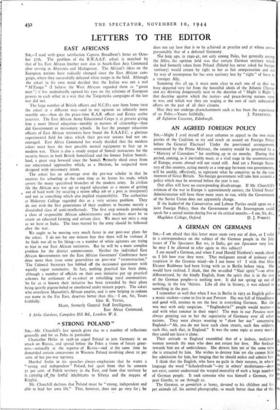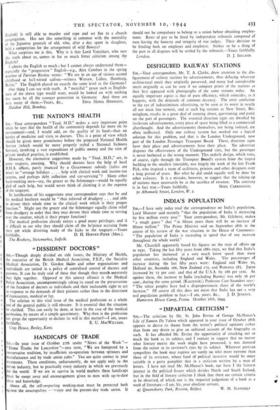A GERMAN ON GERMANS
Stn,—I am afraid that this letter must seem very out of date, as I refer to a correspondence on the subject of the German people in the July issues of The Spectator. But we, in India, get our Spectator very late. So may I be allowed to refer again to this subject?
I am myself a German, and when I read Harold Nicolson's words about us I felt how true they were. That malignant streak of jealousy and suspicion in the German mind—do I not know it? I wish that Miss Eleanor Rathbone had been living with us in Berlin before 1914. She would have realised, I think, that the so-called " Nazi spirit "—so often ' differentiated, by the kindly English, from the .spirit that is in the rest of the German people—is nothing new. It did not spring up out of nothing, in the late 'thirties. Like all else in history, it was related to something in the past.
I remember so well that when I was in Berlin in 19.13 an English girl— a music student—came to live in our Pension. She was full of friendliness and good will, anxious to see the best in everything German. But she was met with only suspicion. " Englanderin!" people would mutter— and with what rancour in their tows! The men in our Pension were always pointing out to her the superiority of Germany over all other nations. They were always wanting to " draw her out " concerning England—" Ah, you do not have such clean streets, such fine soldiers, such this, such that, in England." It was the same topic at every meal; they could not leave it alone.
Their attitude to England resembled that of a jealous, malicious woman towards the man who does not return her love. Her -feelings towards him are of ambivalence. She detests him yet at the same time she is attracted by him. She wishes to destroy him yet she cannot hide her admiration for him, her longing that he should notice and admire her. I think that the English, who have no guile in their natures, in whose language the word " Schadenfreude "—joy in others' misfortunes—does not exist, cannot understand the warped mentality of such a large number of German people. It took someone who was himself a German, the poet Goethe, to see through us.
The German, so gerniitlich at home,, devoted to his children and his pet animals (cf. his animal photography, so much better than that of the
English) is still able to murder and rape and set fire to a church congregation. Has not this something in common with the mentality of the Japanese generals of old, who, after a day spent in slaughter, held a competition for the arrangement of wild flowers?
What surprises me is this. Why is it that Lord Vansittart, who sees the truth about us, comes in for so much bitter criticism among the English? I admire the English so much ; but I cannot always understand them— especially the " progressive " English—e.g., Alex Comfort in the spring number of Partisan Review wrote: " We are in an age of vicious second childhood or hef-witted sadism—witness Warsaw, Lidice, Hamburg, Berlin." The English placed on exactly the same level as the Germans! One thing I can say with truth. A " merciful " peace such as English- men of the above type would want, would be looked on with nothing but scorn by all the younger generation in Germany. And there are



























 Previous page
Previous page